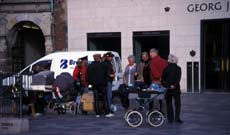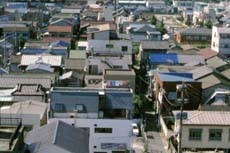index
Issues of justice
click on images for full-size:




Homeless people talking together on the Strøget, Copenhagen

Tokyo roofs

Parisian poster protesting urban redevelopment
The problems of sprawl are serious, but they are hardly the worst problems that we face as cities mutate. Even if everything worked so that suburbia became a more complex, linked, and self-aware place to live, there would remain the problems of justice and poverty. Injustice, poverty, and racial and other oppression grind down lives more thoroughly than sprawl could ever do, especially in the swelling cities of the developing world. What I am suggesting hardly touches these problems. Techniques that could improve sprawl might do only a little for our inner cities and poorer suburbs, and still less for the worldwide favelas and shantytowns of the unneeded. Linkage and complexity by themselves do not solve problems of under-investment and under-education.We need to beware the error that Doreen Massey finds in many recent discussions of sprawl and urbanism, namely, a "frequent abandonment of any progressive project other than multiplicity" (Massey 1994, 223). Problems of the poor will not be solved by the strategies of linkage and complexification, nor by multiculturalism and pluralism, but only by structural economic changes that depend on cultural and institutional changes. Such deeper changes, though, can at least be encouraged by a greater sense of linkage, and by building and planning in ways that discourage social atomization. A greater sense of complexity can also make it more difficult to restrict politics to resentment and single issue identities. More awareness of our insertion into cultural and systemic processes can lessen the psychological hold of oversimple values and make it harder to go along with the oppression that we suffer, or that we perform. Such awareness will not by itself cause change, but it may facilitate imagining new possibilities.